林黛玉海棠诗的绝佳英文翻译
《红楼梦》中林黛玉诗词浅析
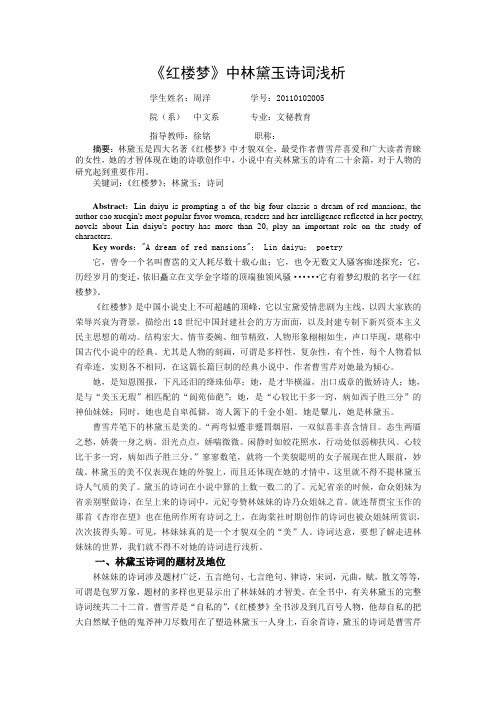
《红楼梦》中林黛玉诗词浅析学生姓名:周洋学号:20110102005院(系)中文系专业:文秘教育指导教师:徐铭职称:摘要:林黛玉是四大名著《红楼梦》中才貌双全,最受作者曹雪芹喜爱和广大读者青睐的女性,她的才智体现在她的诗歌创作中,小说中有关林黛玉的诗有二十余篇,对于人物的研究起到重要作用。
关键词:《红楼梦》;林黛玉;诗词Abstract:Lin daiyu is prompting a of the big four classic a dream of red mansions, the author cao xueqin's most popular favor women, readers and her intelligence reflected in her poetry, novels about Lin daiyu's poetry has more than 20, play an important role on the study of characters.Key words:"A dream of red mansions"; Lin daiyu; poetry它,曾令一个名叫曹霑的文人耗尽数十载心血;它,也令无数文人骚客痴迷探究;它,历经岁月的变迁,依旧矗立在文学金字塔的顶端独领风骚······它有着梦幻般的名字—《红楼梦》。
《红楼梦》是中国小说史上不可超越的顶峰,它以宝黛爱情悲剧为主线,以四大家族的荣辱兴衰为背景,描绘出18世纪中国封建社会的方方面面,以及封建专制下新兴资本主义民主思想的萌动。
结构宏大、情节委婉、细节精致,人物形象栩栩如生,声口毕现,堪称中国古代小说中的经典。
尤其是人物的刻画,可谓是多样性,复杂性,有个性,每个人物看似有牵连,实则各不相同,在这篇长篇巨制的经典小说中,作者曹雪芹对她最为倾心。
林黛玉海棠诗翻译
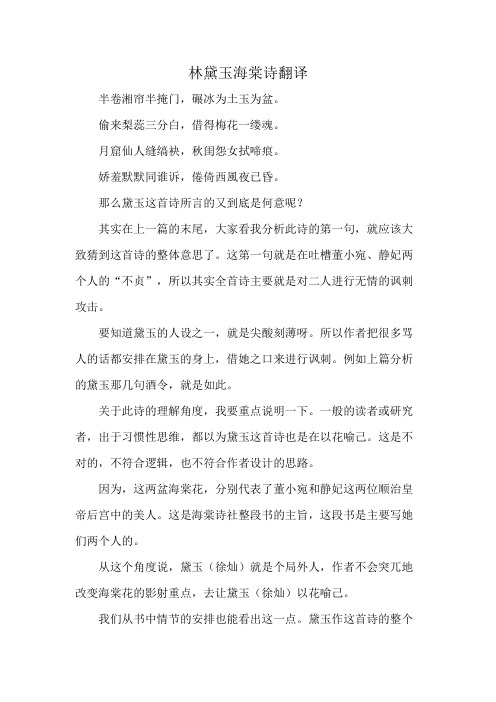
林黛玉海棠诗翻译半卷湘帘半掩门,碾冰为土玉为盆。
偷来梨蕊三分白,借得梅花一缕魂。
月窟仙人缝缟袂,秋闺怨女拭啼痕。
娇羞默默同谁诉,倦倚西風夜已昏。
那么黛玉这首诗所言的又到底是何意呢?其实在上一篇的末尾,大家看我分析此诗的第一句,就应该大致猜到这首诗的整体意思了。
这第一句就是在吐槽董小宛、静妃两个人的“不贞”,所以其实全首诗主要就是对二人进行无情的讽刺攻击。
要知道黛玉的人设之一,就是尖酸刻薄呀。
所以作者把很多骂人的话都安排在黛玉的身上,借她之口来进行讽刺。
例如上篇分析的黛玉那几句酒令,就是如此。
关于此诗的理解角度,我要重点说明一下。
一般的读者或研究者,出于习惯性思维,都以为黛玉这首诗也是在以花喻己。
这是不对的,不符合逻辑,也不符合作者设计的思路。
因为,这两盆海棠花,分别代表了董小宛和静妃这两位顺治皇帝后宫中的美人。
这是海棠诗社整段书的主旨,这段书是主要写她们两个人的。
从这个角度说,黛玉(徐灿)就是个局外人,作者不会突兀地改变海棠花的影射重点,去让黛玉(徐灿)以花喻己。
我们从书中情节的安排也能看出这一点。
黛玉作这首诗的整个过程,是一直远离众人的。
她看花,是从房外看进房内,隔着半卷的湘帘和半掩的门,看到房里的两盆海棠花。
所以她第一句就先表明了这一点,也就是脂批说的“且不说花,且说看花的人”。
然后大家再看书中的描写:独黛玉或抚梧桐,或看秋色,或又和丫鬟们嘲笑……黛玉一开始就是独自一个人在外面院子里。
然后下面一段:宝玉背着手,在回廊上踱来踱去,因向黛玉说道:“你听,他们都有了。
”黛玉道:“你别管我。
”宝玉又见宝钗已誊写出来,因说道:“了不得!香只剩了一寸了,我才有了四句。
”又向黛玉道:“香就完了,只管蹲在那潮地下作什么?”黛玉也不理。
宝玉是在回廊上向院子中“蹲在那潮地下”的黛玉说话。
为何这里特别提到黛玉“蹲在那潮地下”?因为这不就是特意呼应“龄官画蔷”吗?龄官就是蹲在花园的潮地上的。
所以这也证明了龄官的确也是影射董小宛。
葬花吟英文赏析

葬花吟英文赏析《葬花吟》是清代文学家曹雪芹的小说《红楼梦》中女主人公林黛玉吟诵的一首诗。
这首诗通过描绘花儿的凋谢,表达了林黛玉对自身命运的无奈和感叹。
以下是对这首诗的英文赏析:"The Dirge of Flowers" is a poem recited by the female protagonist Lin Daiyu in the novel "Dream of the Red Mansions" written by the Qing Dynasty writer Cao Xueqin. This poem depicts the withering of flowers and expresses Lin Daiyu's helplessness and sigh over her own fate.The poem opens with a description of the soft strings of a spring pavilion and the light touch of cotton-wool on embroidered curtains. This image immediately sets the scene for a poignant tale of a girl's deep feelings of springtime regret."The daughter of the boudoir grieves over the passing of spring, her melancholy heart unable to find release." The first lines are profoundly poignant, as they capture the essence of a girl's heartache over the fleeting beauty of spring. Her solitude andsadness are further emphasized as she "holds the flower hoe in her hand, stepping out of the embroidered curtain, braving the fallen flowers to come and go."The imagery in this section is particularly haunting, as it paints a picture of a girl standing alone, tears streaming down her face as she tenderly tends to the flowers that have begun to wilt. The blood-like stains on the empty branches are a powerful symbol of her emotional anguish.The poem's tone becomes increasingly desolate as it progresses. "The cuckoo was silent at dusk, and she returned with the hoe, closing the heavy door." The cold light of the oil lamp reflects off the white walls, and the icy rain beats against the unheated bedding. The stark loneliness and desolation that surrounds her is a stark contrast to the vibrant life that she once knew.The question "Why do I grieve so deeply?" expresses her tormented thoughts, her emotional upheaval stemming from both her love for spring and her loathing for its inevitable departure. Her deep longing for a time when happiness was hers, and her despair at its loss, arepoignantly expressed through the symbolism of flowers. "The flower and bird spirits cannot be retained, as the birds remain silent and the flowers shrink in shame." She prays that she might be given wings to follow the flowers as they scatter in the wind, far away from this world.However, she knows that even in the boundless sky, there is no resting place for flowers that have lost their way. It is not better to be collected in a brocade purse and hidden from sight, for that would still be a fate worse than death. Her final realization is one of profound sadness; that in a world where flowers cannot find their way, neither can she.The poem's final lines are perhaps its most powerful. "If I had my way, I would rise and float with the flowers, far away from this world." This line sums up her unwavering spirit, her refusal to submit to a fate that does not allow her to be who she truly is. She is not resigned to a life where her spirit is suffocated and her dreams are shattered. Her refusal to accept this fate is a testament to her unwavering will and determination."Dirge of Flowers" is more than just a poem about flowers; it is a profound exploration of human emotion and longing. It is a heartfelt cry from one who has seen what happiness once was and now faces a future that seems bleak and devoid of hope. It is a refusal to accept a world that does not value the individual, a world that does not see the beauty and worth in each unique soul. It is a testament to the resilience of the human spirit in the face of seemingly insurmountable obstacles.。
红楼梦《好了歌》英译

红楼梦《好了歌》英译好了歌世人都晓神仙好,唯有功名忘不了!古今将相在何方?荒冢一堆草没了。
世人都晓神仙好,只有金银忘不了!终朝只恨聚无多,及到多时眼闭了。
世人都晓神仙好,只有姣妻忘不了!君生日日说恩情,君死又随人去了。
世人都晓神仙好,只有儿孙忘不了!痴心父母古来多,孝顺儿女谁见了?大卫.霍克斯英文翻译版本Men all know that salvation should be won,But with ambition won't have done, have done. Where are the famous ones of days gone by?In grassy graves they lie now, every one.Men all know that salvation should be won,But with their riches won't have done, have done. Each day they grumble they've not made enough, When they've enough, it's goodnight everyone. Men all know salvation should be won,But with their loving wives they won't have done. The darlings every day protest their love;But once you're dead, they're off with another one. Men all know that salvation should be won,But with their children won't have done, have done. Yet though of parents fond there is no lack,Of grateful children saw I ne'er a one.杨宪益、戴乃迭翻译版本All men long to be immortals,Yet to riches and rank each aspires;The great ones of old, where are they now? Their graves are a mass of briars.All men long to be immortals,Yet silver and gold they prizeAnd grub for money all their livesTill death seals up their eyes.All men long to be immortalsYet dote on the wives they've wed,Who swear to love their husband evermore But remarry as soon as he's dead.All men long to be immortalsYet with getting sons won't have done. Although fond parents are legion,Who ever saw a really filial son?。
红楼梦海棠诗社的诗词
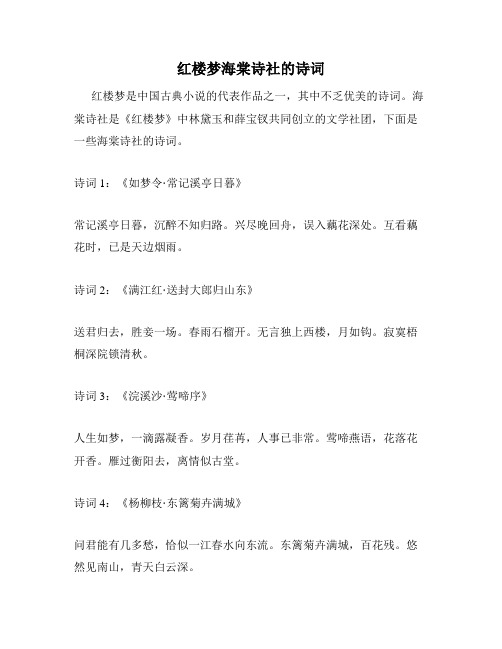
红楼梦海棠诗社的诗词
红楼梦是中国古典小说的代表作品之一,其中不乏优美的诗词。
海棠诗社是《红楼梦》中林黛玉和薛宝钗共同创立的文学社团,下面是一些海棠诗社的诗词。
诗词1:《如梦令·常记溪亭日暮》
常记溪亭日暮,沉醉不知归路。
兴尽晚回舟,误入藕花深处。
互看藕花时,已是天边烟雨。
诗词2:《满江红·送封大郎归山东》
送君归去,胜妾一场。
春雨石榴开。
无言独上西楼,月如钩。
寂寞梧桐深院锁清秋。
诗词3:《浣溪沙·莺啼序》
人生如梦,一滴露凝香。
岁月荏苒,人事已非常。
莺啼燕语,花落花开香。
雁过衡阳去,离情似古堂。
诗词4:《杨柳枝·东篱菊卉满城》
问君能有几多愁,恰似一江春水向东流。
东篱菊卉满城,百花残。
悠然见南山,青天白云深。
诗词5:《卜算子·咏梅》
春色满园关不住,一枝红杏出墙来。
雨打梨花深闭门,忘了青春,误
了青春。
赏心乐事共谁论?花下销魂,月下销魂。
以上是海棠诗社的一些诗词,这些诗词流畅优美,典雅高贵,悠然自得,令人陶醉。
它们不仅仅是文学作品,更是一种精神的寄托和追求,透过这些诗词,我们能够领略到红楼梦中的诗词风范。
长恨歌中英文对照

长恨歌中英文对照白居易原文长恨歌翻译:许渊冲(诗译英法惟一人)THE EVERLASTING REGRET汉皇重色思倾国,御宇多年求不得。
杨家有女初长成,养在深闺人未识。
The beauty-loving monarch longed year after yearTo find a beautiful lady without peer.A maiden of the Yangs* to womanhood just grown,In inner chambers bred, to the world was unknown.*Yang Yu-huan (719-756) was the favourite mistress of Emperor XuanZong (reigned 725-768) of the Tang Dynasty.天生丽质难自弃,一朝选在君王侧。
回眸一笑百媚生,六宫粉黛无颜色。
Endowed with natural beauty too hard to hide,One day she stood selected for the monarch’s side.Turning her head, she smiled so sweet and full of graceThat she outshone in six palaces the fairest face.春寒赐浴华清池,温泉水滑洗凝脂。
She bathed in glassy water of warm-fountain pool,Which laved and smoothed her creamy skin when spring was cool.侍儿扶起娇无力,始是新承恩泽时。
Upborne by her attendants, she rose too faint to move,And this was when she first received the monarch’s love.云鬓花颜金步摇,芙蓉帐暖度春宵。
英语学习资料:英文版的黛玉葬花吟

英语学习资料:英文版的黛玉葬花吟花谢花飞花满天,红消香断有谁怜?游丝软系飘春榭,落絮轻沾扑绣帘;The blossoms fade and falling fill the air,Of fragrance and bright hues bereft and bare. Floss drifts and flutters round the Maiden`s bower, Or softly strikes against her curtained door.闺中女儿惜春暮,愁绪满怀无释处;手把花锄出绣闺,忍踏落花来复去?The Maid ,grieved by these signs of spring`s decease, Seeking some means her sorrow to express,Has rake in hand into the garden gone,Before the fallen flowers are trampled on.柳丝榆荚自芳菲,不管桃飘与李飞;桃李明年能再发,明年闺中知有谁?Elm-pods and willow-floss are fragrant too;Why care,Maid,where the fallen flowers blew?Next year ,when peach and plum-tree bloom again, Which of your sweet panions will remain?三月香巢已垒成,梁间燕子太无情!明年花发虽可啄,却不道人去梁空巢也倾。
This spring the heartless swallow built his nest Beneath the eaves of mud with flowers pressed. Next year the flowers will blossom as before,But swallow ,nest ,and Maid will be no more.一年三百六十日,风刀霜剑严相逼;明媚鲜妍能几时,一朝飘泊难寻觅。
莎士比亚-sonnet-18-29-66的中文翻译及评析
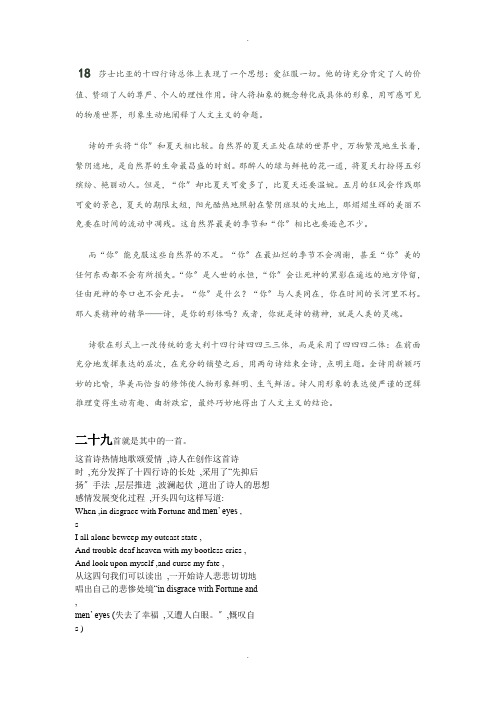
18莎士比亚的十四行诗总体上表现了一个思想:爱征服一切。
他的诗充分肯定了人的价值、赞颂了人的尊严、个人的理性作用。
诗人将抽象的概念转化成具体的形象,用可感可见的物质世界,形象生动地阐释了人文主义的命题。
诗的开头将“你〞和夏天相比较。
自然界的夏天正处在绿的世界中,万物繁茂地生长着,繁阴遮地,是自然界的生命最昌盛的时刻。
那醉人的绿与鲜艳的花一道,将夏天打扮得五彩缤纷、艳丽动人。
但是,“你〞却比夏天可爱多了,比夏天还要温婉。
五月的狂风会作践那可爱的景色,夏天的期限太短,阳光酷热地照射在繁阴班驳的大地上,那熠熠生辉的美丽不免要在时间的流动中凋残。
这自然界最美的季节和“你〞相比也要逊色不少。
而“你〞能克服这些自然界的不足。
“你〞在最灿烂的季节不会凋谢,甚至“你〞美的任何东西都不会有所损失。
“你〞是人世的永恒,“你〞会让死神的黑影在遥远的地方停留,任由死神的夸口也不会死去。
“你〞是什么?“你〞与人类同在,你在时间的长河里不朽。
那人类精神的精华——诗,是你的形体吗?或者,你就是诗的精神,就是人类的灵魂。
诗歌在形式上一改传统的意大利十四行诗四四三三体,而是采用了四四四二体:在前面充分地发挥表达的层次,在充分的铺垫之后,用两句诗结束全诗,点明主题。
全诗用新颖巧妙的比喻,华美而恰当的修饰使人物形象鲜明、生气鲜活。
诗人用形象的表达使严谨的逻辑推理变得生动有趣、曲折跌宕,最终巧妙地得出了人文主义的结论。
二十九首就是其中的一首。
这首诗热情地歌颂爱情,诗人在创作这首诗时,充分发挥了十四行诗的长处,采用了“先抑后扬〞手法,层层推进,波澜起伏,道出了诗人的思想感情发展变化过程,开头四句这样写道:When ,in disgrace with Fortune and men’ eyes ,sI all alone beweep my outcast state ,And trouble deaf heaven with my bootless cries ,And look upon myself ,and curse my fate ,从这四句我们可以读出,一开始诗人悲悲切切地唱出自己的悲惨处境“in disgrace with Fortune and,men’ eyes (失去了幸福,又遭人白眼。
红楼梦点评经典句子英文
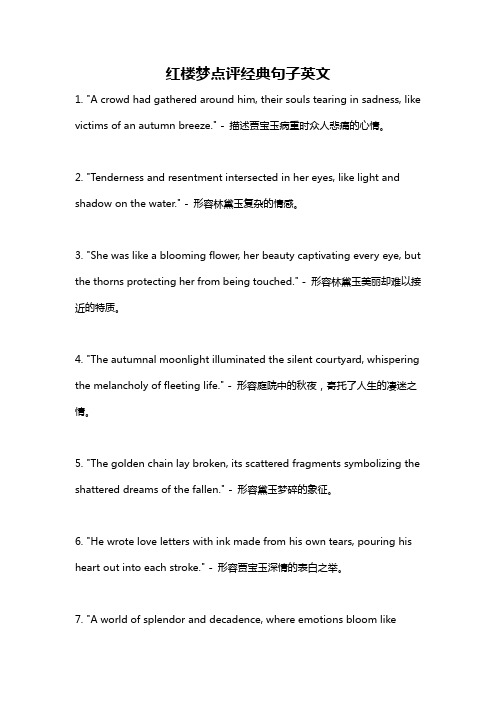
红楼梦点评经典句子英文1. "A crowd had gathered around him, their souls tearing in sadness, like victims of an autumn breeze." - 描述贾宝玉病重时众人悲痛的心情。
2. "Tenderness and resentment intersected in her eyes, like light and shadow on the water." - 形容林黛玉复杂的情感。
3. "She was like a blooming flower, her beauty captivating every eye, but the thorns protecting her from being touched." - 形容林黛玉美丽却难以接近的特质。
4. "The autumnal moonlight illuminated the silent courtyard, whispering the melancholy of fleeting life." - 形容庭院中的秋夜,寄托了人生的凄迷之情。
5. "The golden chain lay broken, its scattered fragments symbolizing the shattered dreams of the fallen." - 形容黛玉梦碎的象征。
6. "He wrote love letters with ink made from his own tears, pouring his heart out into each stroke." - 形容贾宝玉深情的表白之举。
7. "A world of splendor and decadence, where emotions bloom likeflowers in a delicate garden." - 形容红楼梦中的世界充满了繁华与堕落,情感犹如花园中盛开的花朵。
《红楼梦》英译诗词赏析

《红楼梦》英译诗词赏析《红楼梦》中的诗词曲赋共约170首。
不同译本采用了不同的体裁翻译,一些英译本采用自由体进行翻译。
接下来,小编给大家准备了《红楼梦》英译诗词赏析,欢迎大家参考与借鉴。
《红楼梦》英译诗词赏析例1、冯紫英唱曲你是个可人;你是个多情;你是个刁钻古怪鬼精灵;——你是个神仙也不灵。
我说的话儿你全不信,只叫你去背地里细打听,才知道我疼你不疼你!杨译:You can bill and you can coo,Be an imp of mischief too,But a fairy? No, not you,As my word you doubt.Ask around and you’ll find outI love you. yes, I do!霍译:You’re so exciting,And so inviting;You’re my Mary Contrary;You’re a crazy, mad thing.Yo u’re my goddess, but oh! You’re deaf to my praying:Why won’t you listen to what I am saying?If you don’t believe me, make a small investigation:You will soon find out the true depth of my admiration.解析:1)对于这段唱曲,两位译者的译文不论是风格还是遣词造句上差别较大。
原文小调活泼俏皮,霍译不免有些沉闷臃肿。
此外,investigation、admiration这类大字眼用在民间小调上似乎并不适合。
反观杨译,弃“形”求“神”,整个译文节奏轻快,押韵得当,朗朗上口。
2)值得注意的是,对于“刁钻古怪鬼精灵”的处理,霍译其中的“刁钻古怪鬼精灵”被霍克斯译成了“Mary Contrary”,“Mary Contrary”来自英国的一首儿歌,所谓contrary, 指她颇难相处,难按常规捉摸,在这一点上,接近原文的“刁钻古怪鬼精灵”。
葬花吟英文赏析

葬花吟英文赏析【提纲】1.介绍《葬花吟》的背景和作者《葬花吟》是清代著名作家曹雪芹所著《红楼梦》中的一首诗。
这首诗由女主角林黛玉吟诵,描述了她对生命、爱情和命运的感慨。
林黛玉在小说中是一个极具才情但又命运多舛的女子,这首诗表达了她内心的无奈和悲痛。
2.分析《葬花吟》的英文翻译《葬花吟》的英文翻译为"The Lament of Flower Burial"。
这里,“葬”字翻译为"burial",准确地传达了花葬的含义;"花"翻译为"flower",既体现了诗的主题,又保持了原文的形象;"吟"字则用"lament"来表达,传达了诗人的感慨之情。
3.赏析《葬花吟》的英文表达手法和优点首先,这首诗的英文翻译在词汇选择上非常到位,如“泪眼问花花不语,乱红飞过秋千去”翻译为"Tears rolling down her eyes, she asks the flowers, but they remain silent.The scattered red petals fly away like autumn swings." 这句话生动地描绘了林黛玉葬花时的悲伤景象,英文表达也富有诗意。
其次,翻译者在表达诗的意境时,采用了意译的方式,如“花开堪折直须折,莫待无花空折枝”翻译为"When flowers bloom, pluck them; don"t wait until there are no flowers left to pick on the branches." 这样的表达既保留了原文的意义,又让英文读者能够感受到诗中的寓意。
最后,这首诗的英文翻译在句式和语法上处理得当,如“花谢花飞花满天,红消香断有谁怜?”翻译为"Flowers wither and fall, filling the sky with their decay.Who will pity the redness gone and the fragrance vanished?" 这句话在英文中流畅自然,体现了译者的语言功底。
关于海棠的英文诗歌
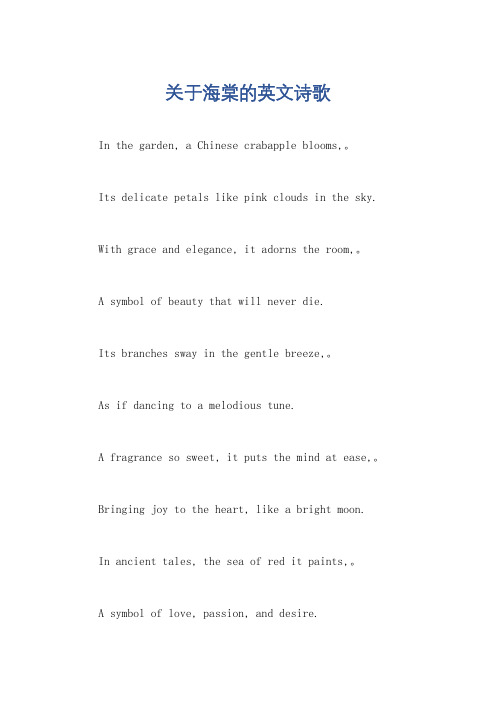
关于海棠的英文诗歌In the garden, a Chinese crabapple blooms,。
Its delicate petals like pink clouds in the sky. With grace and elegance, it adorns the room,。
A symbol of beauty that will never die.Its branches sway in the gentle breeze,。
As if dancing to a melodious tune.A fragrance so sweet, it puts the mind at ease,。
Bringing joy to the heart, like a bright moon. In ancient tales, the sea of red it paints,。
A symbol of love, passion, and desire.Its presence, like a poet's words, enchants,。
Igniting the soul with a passionate fire.Through seasons of change, it stands tall,。
Resilient and strong, against nature's test.A reminder that beauty will never fall,。
Even when faced with life's hardest quest.So let us cherish the Chinese crabapple's grace,。
Its beauty, like a painting, forever preserved.In gardens and hearts, it finds its rightful place,。
黛玉给香菱讲诗的过程英语作文题目

黛玉给香菱讲诗的过程英语作文题目全文共3篇示例,供读者参考篇1The Poetic Lessons: Lin Daiyu's Instruction of Xiang LingAs students of literature, we are often tasked with analyzing the great works of poetry and prose that have shaped the cultural landscape of our world. However, few texts hold as much significance and fascination as the 18th century Chinese novel, "Dream of the Red Chamber" by Cao Xueqin. Within its pages lies a rich tapestry of characters, each woven with intricate complexities that reflect the nuances of human nature.One particular relationship that has captured the imagination of scholars and readers alike is the dynamic between Lin Daiyu and Xiang Ling – two cousins whose bond transcends mere familial ties. It is through this connection that we witness a profound exchange of knowledge, as the melancholic yet erudite Daiyu imparts her poetic wisdom upon the eager and attentive Xiang Ling.The scenes that depict these lessons are not mere literary devices but rather serve as windows into the depth of humanconnection and the transformative power of education. As we delve into the pages, we find ourselves transported to a world where poetry is not just a collection of words but a living, breathing entity that shapes the very fabric of existence.Daiyu's approach to teaching is both gentle and profound, reflecting her own introspective nature. She does not simply recite verses but instead guides Xiang Ling through a journey of understanding, encouraging her to explore the deeper meanings and emotions that lie beneath the surface. With each line of poetry, Daiyu unveils layers of metaphor and symbolism, inviting her pupil to see beyond the literal and embrace the transcendent.Their lessons often take place in the tranquil confines of the Prospect Garden, a setting that seems to echo the serenity and beauty of the poetry they study. Surrounded by the fragrance of blossoming flowers and the gentle trickle of streams, the two cousins immerse themselves in the timeless works of renowned poets, their voices blending in harmonious recitation.Daiyu's instruction is not merely a transference of knowledge but a shared experience, a tapestry woven from the threads of emotion and understanding. She encourages Xiang Ling to approach each poem with an open heart, to feel theweight of the words as they resonate within her soul. In doing so, the lessons transcend the boundaries of academia and become a profound exploration of the human condition.Through Daiyu's guidance, Xiang Ling begins to grasp the nuances of poetic expression, the delicate balance between form and content, the careful selection of imagery, and the underlying currents of emotion that give each verse its power. She learns to appreciate the intricate interplay of words, the way they dance upon the tongue and whisper secrets to the heart.Yet, these lessons are not merely one-sided; Daiyu, too, finds herself enriched by the process. In Xiang Ling's eager questions and insightful observations, she rediscovers her own love for poetry, rekindling the flames of passion that may have dimmed under the weight of her melancholic disposition. Their shared journey becomes a mutual exchange, a give-and-take of knowledge and understanding that transcends the roles of teacher and student.As the lessons progress, we bear witness to Xiang Ling's transformation – a blossoming of the mind and spirit that mirrors the unfolding of a delicate flower. With each verse absorbed, she gains not only an appreciation for the art of poetry but also a deeper understanding of herself and the world around her. Thewords become a lens through which she can examine the complexities of human emotion, the fragility of existence, and the enduring beauty that persists even in the face of adversity.Moreover, these lessons serve as a testament to the enduring power of education and the profound impact that a dedicated teacher can have upon a student's life. Daiyu's patience, her willingness to guide and nurture, and her unwavering belief in Xiang Ling's potential create an environment where learning flourishes and personal growth knows no bounds.In the end, the poetic lessons shared between Lin Daiyu and Xiang Ling transcend the boundaries of the novel itself, becoming a timeless metaphor for the transformative nature of knowledge and the enduring strength of human connection. Through their journey, we are reminded of the profound impact that a single person can have upon another's life, and the lifelong ripples that emanate from such moments of shared understanding.As students of literature, we are fortunate to bear witness to this remarkable exchange, to trace the intricate threads that bind these two souls together in a tapestry of poetry and emotion. And in doing so, we are invited to embark on our own journey ofself-discovery, to seek out those moments of profound connection that elevate our understanding and enrich our spirits.For it is in the embrace of such lessons that we truly come to understand the power of words, the depth of human experience, and the enduring legacy of those who dared to share their knowledge with open hearts and open minds.篇2A Poetic Pursuit: Daiyu's Elegant Guidance in the Garden of Literary DelightsAs the crimson rays of the setting sun painted the lush gardens of the Rongguo Mansion with a warm, golden hue, a scene of intellectual refinement unfolded amidst the fragrant blooms. Daiyu, the embodiment of literary grace, sat beside her cousin and dearest friend, Xianglian, her delicate features aglow with the passion of a true scholar. In this tranquil oasis, the exchange of poetic wisdom flowed like a melodic stream, carrying the weight of ancient traditions and the promise of newfound understanding.Xianglian, ever the eager learner, leaned forward, her eyes brimming with curiosity as Daiyu's melodious voice filled the air. "Poetry," Daiyu began, "is the language of the soul, a tapestrywoven from the threads of human experience and emotion." Her words held a reverence that commanded attention, for she spoke not merely of verses and rhymes, but of a profound art that transcended the boundaries of time and culture.With the poise of a seasoned scholar, Daiyu delved into the annals of literary history, guiding Xianglian through the rich tapestry of Chinese poetry. She recited the timeless works of Li Bai, whose verses danced like the untamed winds, capturing the essence of nature's majesty. Then, with equal fervor, she shared the introspective musings of Du Fu, whose lines resonated with the depths of human sorrow and resilience.Xianglian, enthralled by the lyrical cadence of Daiyu's recitations, found herself transported to distant realms, where the past and present intertwined in a harmonious embrace. Each line, carefully dissected and analyzed, revealed layers of meaning that had previously eluded her comprehension. Daiyu's insights were akin to a luminous beacon, illuminating the intricate symbolism and metaphors that lay veiled beneath the surface of the words.Yet, Daiyu's tutelage extended beyond the mere appreciation of poetic masterpieces; it was a quest to ignite within Xianglian the very spark that fueled the creative spirit.With gentle encouragement, she urged her cousin to explore the depths of her own emotions, to draw inspiration from the tapestry of life that surrounded them. "Poetry," Daiyu whispered, her voice tinged with reverence, "is the mirror that reflects the soul, the canvas upon which we paint our innermost thoughts and yearnings."Emboldened by Daiyu's guidance, Xianglian tentatively began to weave her own verses, her words faltering at first, but gradually finding their rhythm and cadence. Daiyu's unwavering patience and nurturing spirit provided a safe haven for Xianglian's creative endeavors, offering gentle critiques and insightful suggestions that refined her raw talent.As the twilight hours faded into the embrace of night, their poetic discourse continued, punctuated by the melodious chirping of crickets and the gentle rustling of leaves. In this ethereal setting, the boundaries between teacher and student blurred, and their exchange became a harmonious duet, each enriching the other with their unique perspectives and interpretations.Daiyu, ever the consummate scholar, delved into the nuances of poetic forms, guiding Xianglian through the intricacies of regulated verse and the freedom of free-flowingcompositions. She shared the secrets of crafting vivid imagery, of evoking emotions through carefully chosen words, and of capturing the essence of fleeting moments in timeless verse.Xianglian, her mind brimming with newfound knowledge and her heart swelling with creative fervor, found herself embarking on a journey of self-discovery. Through the lens of poetry, she explored the depths of her own experiences, translating the joys and sorrows of life into poignant lines that resonated with profound meaning.As the night gave way to the first whispers of dawn, their poetic exchange reached its crescendo, a symphony of shared wisdom and mutual admiration. Daiyu, her eyes shining with pride, bestowed upon Xianglian the highest praise a mentor could offer – the acknowledgment of her growth and the promise of her future as a poet in her own right.In that moment, the gardens of the Rongguo Mansion became a sacred space, a sanctuary where the pursuit of literary excellence transcended the boundaries of time and circumstance. Daiyu's guidance had not only imparted knowledge but had also ignited a flame within Xianglian, a flame that would burn brightly, illuminating her path as a devotee of the poetic arts.As they parted ways, their hearts brimming with the echoes of shared verses and the warmth of their newfound bond, both Daiyu and Xianglian carried with them a profound understanding – that poetry was not merely a collection of words, but a language that spoke to the very essence of the human condition. It was a journey of self-discovery, a celebration of beauty, and a testament to the enduring power of the written word.In the days and years that followed, the gardens of the Rongguo Mansion would bear witness to many more such gatherings, where the pursuit of poetic wisdom would intertwine with the blossoming of lasting friendships and the cultivation of literary excellence. And at the heart of it all would be Daiyu, a beacon of grace and erudition, guiding those who sought her counsel along the winding paths of literary enlightenment.篇3The Delicate Art of Poetry Recitation: Lin Daiyu's Lessons for Xue BaochaiAs students of classical Chinese literature, we are often captivated by the intricate beauty of poetry, where each carefully chosen word holds the power to evoke profound emotions and paint vivid mental images. Among the many celebrated literaryworks, the novel "Dream of the Red Chamber" stands as a testament to the enduring allure of poetic expression. Within its pages, we bear witness to a remarkable scene – the elegant Lin Daiyu imparting her profound understanding of poetry to the eager Xue Baochai. This essay aims to explore the nuances of their interaction, delving into the depths of Daiyu's poetic wisdom and Baochai's thirst for enlightenment.Daiyu's gentle yet commanding presence immediately sets the tone for these private lessons. Her graceful demeanor belies a sharp intellect and a deep reverence for the art of poetry. As she invites Baochai into her realm of literary appreciation, one can almost envision the hushed atmosphere, where every word carries weight and every pause holds significance.The lessons commence with Daiyu's careful selection of poems, each one a masterpiece in its own right. She understands that poetry is not merely a collection of words but a tapestry woven from the threads of human experience, emotion, and insight. With each recitation, Daiyu unveils the layers of meaning, guiding Baochai through the intricate wordplay, metaphors, and allusions that breathe life into the verses.Baochai, a willing student with an insatiable curiosity, hangs onto Daiyu's every utterance. Her eyes shine with the desire tocomprehend the depths of poetic expression, to unravel the mysteries that lie beneath the surface. Daiyu, ever the patient mentor, recognizes the importance of allowing Baochai's understanding to unfold organically, like a delicate blossom opening to the warmth of the sun.As the lessons progress, Daiyu's teachings transcend mere recitation and analysis. She imparts the art of appreciating the nuances of rhythm, the careful selection of words, and the powerful emotions that each poem evokes. Baochai learns to savor the delicate balance between structure and free expression, to allow the words to resonate within her very being.Daiyu's mastery extends beyond the theoretical; she encourages Baochai to immerse herself in the lived experiences that inspired the poets of old. Through vivid descriptions and insightful anecdotes, she transports Baochai to the very moments that birthed the verses they study, allowing her to connect with the emotions and contexts that underpinned each masterpiece.As their sessions unfold, a profound bond develops between teacher and student, forged through their shared love for the written word. Daiyu's patience and Baochai's eagerness create a harmonious symphony, where the exchange of knowledgebecomes a sacred ritual, a celebration of the enduring power of poetry.Yet, these lessons extend far beyond the confines of mere literary study. Daiyu's teachings inadvertently become a mirror, reflecting the complexities of human nature and the intricate tapestry of emotions that govern our existence. Through the lens of poetry, Baochai gains insights into the depths of love, loss, joy, and sorrow – universal experiences that resonate across time and culture.In Daiyu's gentle guidance, Baochai discovers the art ofself-expression, of giving voice to her innermost thoughts and feelings. The poems they study become vessels for her own personal growth, allowing her to explore the vast realms of her own emotions and to find solace in the timeless wisdom of the ages.As their journey through the realm of poetry continues, Baochai's appreciation deepens, and her understanding blossoms into a profound reverence for the art form. She comes to recognize the power of words to heal, to inspire, and to transcend the boundaries of time and space.In turn, Daiyu's teachings become a testament to the enduring legacy of poetry, a bridge that connects generations,cultures, and souls. Through her patient guidance, she ensures that the flame of poetic appreciation burns brightly, passing the torch to a new generation of appreciators and guardians of this sacred art.As their lessons draw to a close, Baochai emerges transformed, her mind and heart enriched by the depths of poetic wisdom she has absorbed. She carries with her a newfound appreciation for the beauty and complexity of the written word, a skill that will undoubtedly shape her perception of the world and her interactions with others.In the end, Daiyu's lessons are not merely about reciting and analyzing poetry; they are a profound exploration of the human condition, a celebration of the enduring power of language to inspire, to heal, and to connect souls across vast expanses of time and space. Through their shared journey, teacher and student have woven a tapestry of understanding, one that will forever echo in the corridors of literary appreciation and personal growth.。
黛玉教香菱作诗内容完整版,作文

黛玉教香菱作诗内容完整版,作文英文回答:As a fan of "Dream of the Red Chamber", I am familiar with the character Xiangling, also known as Xianglian or Xiangling. She is a maid in the Rongguo Mansion and is often seen interacting with the main character, Daiyu. In one of the chapters, Daiyu teaches Xiangling how to write poetry.Daiyu's poetry lesson to Xiangling is a beautiful and memorable scene in the novel. Daiyu starts by explaining the basic structure of a poem, which usually consists of four lines with five or seven characters in each line. She teaches Xiangling how to choose appropriate words and how to use metaphors and symbolism to enhance the meaning of the poem.Daiyu encourages Xiangling to express her emotions and personal experiences through poetry. She tells her toobserve nature and draw inspiration from it. For example, Daiyu suggests Xiangling to describe the beauty of flowers, the serenity of a moonlit night, or the melancholy of a rainy day. By using vivid descriptions and heartfelt emotions, Xiangling's poems become more relatable and powerful.Daiyu also advises Xiangling to read and study famous poems written by renowned poets. By analyzing and learning from these masterpieces, Xiangling can improve her own poetic skills. Daiyu recommends poets like Li Bai, Du Fu, and Su Shi, whose works are known for their elegance and depth.Through their poetry lessons, Daiyu and Xiangling develop a close bond. They share their thoughts andfeelings through their poems, and this helps them understand each other better. Xiangling's poems gradually become more refined and expressive, reflecting her growth as a poet and as an individual.中文回答:作为《红楼梦》的粉丝,我对黛玉教香菱写诗的情节非常熟悉。
林黛玉海棠诗的绝佳英文翻译
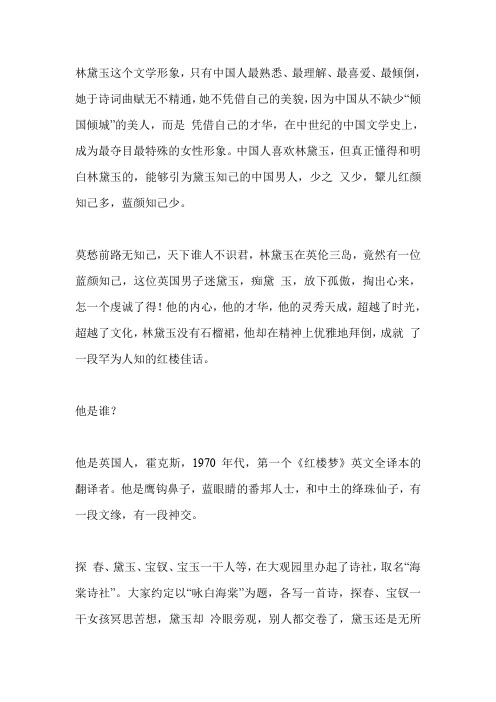
林黛玉这个文学形象,只有中国人最熟悉、最理解、最喜爱、最倾倒,她于诗词曲赋无不精通,她不凭借自己的美貌,因为中国从不缺少“倾国倾城”的美人,而是凭借自己的才华,在中世纪的中国文学史上,成为最夺目最特殊的女性形象。
中国人喜欢林黛玉,但真正懂得和明白林黛玉的,能够引为黛玉知己的中国男人,少之又少,颦儿红颜知己多,蓝颜知己少。
莫愁前路无知己,天下谁人不识君,林黛玉在英伦三岛,竟然有一位蓝颜知己,这位英国男子迷黛玉,痴黛玉,放下孤傲,掏出心来,怎一个虔诚了得!他的内心,他的才华,他的灵秀天成,超越了时光,超越了文化,林黛玉没有石榴裙,他却在精神上优雅地拜倒,成就了一段罕为人知的红楼佳话。
他是谁?他是英国人,霍克斯,1970年代,第一个《红楼梦》英文全译本的翻译者。
他是鹰钩鼻子,蓝眼睛的番邦人士,和中土的绛珠仙子,有一段文缘,有一段神交。
探春、黛玉、宝钗、宝玉一干人等,在大观园里办起了诗社,取名“海棠诗社”。
大家约定以“咏白海棠”为题,各写一首诗,探春、宝钗一干女孩冥思苦想,黛玉却冷眼旁观,别人都交卷了,黛玉还是无所谓,李宫裁催她,黛玉才提笔,怎料七律一首,一挥而就,掷给她们,一个“掷”字,颇有气魄,林妹妹才华出众,鹤立鸡群,可见一斑。
黛玉的诗是这样的:半卷湘帘半掩门,碾冰为土玉为盆。
偷来梨蕊三分白,借得梅花一缕魂。
月窟仙人缝缟袂,秋闺怨女拭啼痕。
娇羞默默同谁诉,倦倚西风夜已昏。
黛玉的第一句,相当80后,“半卷湘帘半掩门”,这哪里是一个贵族小姐的作派,俨然一个任性任情的女孩作派,宝钗的第一句是“珍重芳姿昼掩门”,一个“珍重芳姿”写温良端淑,也难怪,宝钗是豪门薛家的女二代,可黛玉偏偏不珍重芳姿,半掩门,真性情,好洒脱。
“碾冰为土玉为盆”,用“冰”“玉”形容海棠花,这是对海棠花的最高赞美,黛玉以海棠花自喻,既提高了海棠花的品位,又以花照人,三分白,是说梨花的洁白无暇,一缕魂,是说梅花的高尚品格,不仅美轮美奂,而且圣洁崇高,赋予了海棠花美丽,也赋予了海棠花情操。
红楼梦英文赏析,判词,英文翻译对比

霍译: You shall,when twenty years in life’s hard school are done, In pomegranate-time to palace halls ascend. Though three springs never could with your first spring compare, When hare meets tiger your great dream shall end.
桃李春风结子完,到头谁似一盆兰? 如冰水好空相妒,枉与他人作笑谈。
霍译: The plum-tree bore her fruit after the rest, Yet, when all’s done, her Orchid was the best. Against your ice-pure nature all in vain, The tongues of envy wagged; you felt no pain.
二十年来辨是非,榴花开处照宫闱; 三春争及初春景,虎兔相逢大梦归。
金陵十二钗图册判词之 迎春
Jia Yingchun
杨译: For husband she will have a mountain wolf, His object gained he ruthlessly berates her; Fair bloom, sweet willow in a golden bower, Too soon a rude awakening awaits her.
桃李春风结子完,到头谁似一盆兰? 如冰水好空相妒,枉与他人作笑谈。
金陵十二钗图册判词之 秦可卿
长恨歌英语翻译

长恨歌英语翻译长恨歌英语翻译白居易的《长恨歌》在艺术上以什么感染和诱惑着读者呢?宛转动人,缠绵悱恻,恐怕是它最大的艺术个性,也是它能吸住千百年来的读者,使他们受感染、被诱惑的力量。
《长恨歌》白居易汉皇重色思倾国,御宇多年求不得。
杨家有女初长成,养在深闺人未识。
天生丽质难自弃,一朝选在君王侧。
回眸一笑百媚生,六宫粉黛无颜色。
春寒赐浴华清池,温泉水滑洗凝脂。
侍儿扶起娇无力,始是新承恩泽时。
云鬓花颜金步摇,芙蓉帐暖度春宵。
春宵苦短日高起,从此君王不早朝。
承欢侍宴无闲暇,春从春游夜专夜。
后宫佳丽三千人,三千宠爱在一身。
金星妆成娇侍夜,玉楼宴罢醉和春。
姊妹弟兄皆列士,可怜光彩生门户。
遂令天下父母心,不重生男重生女。
骊宫高处入青云,仙乐风飘处处闻。
缓歌慢舞凝丝竹,尽日君王看不足。
渔阳鼙鼓动地来,惊破霓裳羽衣曲。
九重城阙烟尘生,千乘万骑西南行。
翠华摇摇行复止,西出都门百馀里。
六军不发无奈何,宛转蛾眉马前死。
花钿委地无人收,翠翘金雀玉搔头。
君王掩面救不得,回看血泪相和流。
黄埃散漫风萧索,云栈萦纡登剑阁。
峨嵋山下少人行,旌旗无光日色薄。
蜀江水碧蜀山青,圣主朝朝暮暮情。
行宫见月伤心色,夜雨闻铃肠断声。
天旋地转回龙驭,到此踌躇不能去。
马嵬坡下泥土中,不见玉颜空死处。
君臣相顾尽沾衣,东望都门信马归。
归来池苑皆依旧,太液芙蓉未央柳。
芙蓉如面柳如眉,对此如何不泪垂! 春风桃李花开日,秋雨梧桐叶落时。
西宫南内多秋草,落叶满阶红不扫。
梨园子弟白发新,椒房阿监青娥老。
夕殿萤飞思悄然,孤灯挑尽未成眠。
迟迟钟鼓初长夜,耿耿星河欲曙天。
鸳鸯瓦冷霜华重,翡翠衾寒谁与共? 悠悠生死别经年,魂魄不曾来入梦。
临邛道士鸿都客,能以精诚致魂魄。
为感君王辗转思,遂教方士殷勤觅。
排空驭气奔如电,升天入地求之遍。
上穷碧落下黄泉,两处茫茫皆不见。
忽闻海上有仙山,山在虚无缥缈间。
楼阁玲珑五云起,其中绰约多仙子。
中有一人字太真,雪肤花貌参差是。
金阙西厢叩玉扃,转教小玉报双成。
葬花吟英文赏析

葬花吟英文赏析
一、简介《葬花吟》及其作者
《葬花吟》是清代著名作家曹雪芹所著《红楼梦》中的一首诗歌。
这首诗歌描绘了贾宝玉在葬花过程中所感受到的悲伤与感慨,以花喻人,寄托了作者对生命、命运和爱情的思考。
二、英语赏析《葬花吟》的诗句
1."The flowers fall,the wind grieves",这句诗句表达了花朵凋谢时,风也感到悲伤的意境。
2."The living envies the dead",生者嫉妒死者,揭示了人生的无常和生死的无奈。
3."A dreamer dreams forever in the dreamland",梦想者在梦境中永恒追寻,寓意着人生的执着与坚守。
三、分析《葬花吟》中的意象和象征意义
1.花:象征美好、短暂的生命和命运的无常。
2.葬花:寓意生命的终结和生与死的辩证关系。
3.眼泪:代表悲伤、感慨和无奈。
四、探讨《葬花吟》的情感内涵和主题
《葬花吟》以花喻人,表达了作者对生命、命运和爱情的感慨。
诗歌中蕴含着人生的无常、生死的无奈以及爱情的悲欢离合,展现了作者对命运的无奈和对美好生活的向往。
五、总结英语赏析的意义和启示
通过对《葬花吟》的英语赏析,我们可以更好地理解诗歌中的意境、情感和主题。
同时,这也为我们提供了一个跨文化交流的视角,让我们认识到中国古典文学的魅力和普世价值。
- 1、下载文档前请自行甄别文档内容的完整性,平台不提供额外的编辑、内容补充、找答案等附加服务。
- 2、"仅部分预览"的文档,不可在线预览部分如存在完整性等问题,可反馈申请退款(可完整预览的文档不适用该条件!)。
- 3、如文档侵犯您的权益,请联系客服反馈,我们会尽快为您处理(人工客服工作时间:9:00-18:30)。
林黛玉这个文学形象,只有中国人最熟悉、最理解、最喜爱、最倾倒,她于诗词曲赋无不精通,她不凭借自己的美貌,因为中国从不缺少“倾国倾城”的美人,而是凭借自己的才华,在中世纪的中国文学史上,成为最夺目最特殊的女性形象。
中国人喜欢林黛玉,但真正懂得和明白林黛玉的,能够引为黛玉知己的中国男人,少之又少,颦儿红颜知己多,蓝颜知己少。
莫愁前路无知己,天下谁人不识君,林黛玉在英伦三岛,竟然有一位蓝颜知己,这位英国男子迷黛玉,痴黛玉,放下孤傲,掏出心来,怎一个虔诚了得!他的内心,他的才华,他的灵秀天成,超越了时光,超越了文化,林黛玉没有石榴裙,他却在精神上优雅地拜倒,成就了一段罕为人知的红楼佳话。
他是谁?
他是英国人,霍克斯,1970年代,第一个《红楼梦》英文全译本的翻译者。
他是鹰钩鼻子,蓝眼睛的番邦人士,和中土的绛珠仙子,有一段文缘,有一段神交。
探春、黛玉、宝钗、宝玉一干人等,在大观园里办起了诗社,取名“海棠诗社”。
大家约定以“咏白海棠”为题,各写一首诗,探春、宝钗一干女孩冥思苦想,黛玉却冷眼旁观,别人都交卷了,黛玉还是无所
谓,李宫裁催她,黛玉才提笔,怎料七律一首,一挥而就,掷给她们,一个“掷”字,颇有气魄,林妹妹才华出众,鹤立鸡群,可见一斑。
黛玉的诗是这样的:
半卷湘帘半掩门,碾冰为土玉为盆。
偷来梨蕊三分白,借得梅花一缕魂。
月窟仙人缝缟袂,秋闺怨女拭啼痕。
娇羞默默同谁诉,倦倚西风夜已昏。
黛玉的第一句,相当80后,“半卷湘帘半掩门”,这哪里是一个贵族小姐的作派,俨然一个任性任情的女孩作派,宝钗的第一句是“珍重芳姿昼掩门”,一个“珍重芳姿”写温良端淑,也难怪,宝钗是豪门薛家的女二代,可黛玉偏偏不珍重芳姿,半掩门,真性情,好洒脱。
“碾冰为土玉为盆”,用“冰”“玉”形容海棠花,这是对海棠花的最高赞美,黛玉以海棠花自喻,既提高了海棠花的品位,又以花照人,三分白,是说梨花的洁白无暇,一缕魂,是说梅花的高尚品格,不仅美轮美奂,而且圣洁崇高,赋予了海棠花美丽,也赋予了海棠花情操。
“月窟仙人缝缟抉,秋闺怨女拭啼痕”,冥冥之中,在寂静寥廓的月宫里,嫦娥在缝缟抉,凄凉萧疏,而黛玉则在秋闺之中暗暗哭泣,最后一句,黛玉泪眼望海棠,满腹情愁,满腹心事,思宝玉,悲身世,和海棠倾诉,西风落叶,黄昏遍地,黛玉泪干了,身倦了,恍恍惚惚,黛玉语花,花语黛玉。
全诗之中没有“泪”字,但是通篇都是泪意、泪情,字面上无“泪”,却无处不泪,这是这首诗的巧妙绝伦之处,所以,颦儿的海棠花,实际上是“海、棠、泣、泪”,因为,花即黛玉,因为她有梅花之魂,黛玉即花,因为她有梨花之白,人花相望、相守、相诉,有泪、有情、有娇羞,有西风,这是一副海棠泣泪的诗意画面。
中文七律诗变成了英文“一句话”
霍克斯翻译林黛玉的“咏海棠花”,倾注了巨大的虔诚和才华,这个性情男人,竟然用英语的一个句子,翻译了黛玉的整首诗,中文的七律,变成了英文的“一句”诗,不仅中国人闻所未闻,就是英国翻译界,也罕有如此率性无羁的翻译先例。
Beside the half-raised blind,the half-closed door,
Crushed ice for earth and white jade for pot,
three parts of whiteness from the pear-tree stolen,
One part from plum for scent(which pear has not)-
Moon-maidens stitched them with white silken thread,
And virgins' tears the new-made flowers did spot,
Which now,like bashful maids that no word say,
Lean languid on the breeze at close of day.
一个完美的英文长句,竟然包涵了中国一首绝妙的七律,以才华对撞才华,以虔诚敬奉我们的绛珠仙子,这一段翻译,有情,有意,中文七律本是两行泪,英文诗则似是泪水流淌,富有高度的形式美,一气呵成。
首先,译作以door、pot、no、spot为韵,say和day为韵,虽然中文七律是一韵到底,原诗用盆、魂、痕、昏为韵,但英文诗只有打油诗或喜剧中才会出现“一韵到底”,所以,作为一首严肃的英文诗歌,还是要变韵的,虽然,变韵了,但是say和day,这两个长元音构成了一种浑厚悠长,绕梁三日的音韵效果,极为悠远、哀戚,特别符合林妹妹在结尾坐困黄昏中的无限惆怅。
所以,霍克斯的英文
译作,如歌如诉,我们不妨轻轻诵读,真是抑扬顿挫,节奏舒缓,直至结尾,余韵袅袅、挥之不去。
译作不仅在音律方面不亚于原作,而且,诗歌的形式也让人惊叹,大家看前面六行,这是一组圆周句,形式工整,前六行,景物一一扑面而来,峰回路转,柳暗花明,极具视觉冲击力,把原诗中的绚烂、美丽,在饱满的诗潮跌宕中,淋漓尽致地铺陈出来,前面是状语,主句在后面才豁然出现。
难得的是,霍克斯品到了颦儿的“泪”,懂了颦儿的“泪”,译文中,以virgins' tears,画龙点睛般地为西方读者传递了这首诗的诗境,颦儿的这首诗,既咏物,又寄怀,花人合一,而霍克斯注意到了不仅要把景物引介给西方读者,还要把景物背后所寄托的情感,准确无误地传递给西方读者,他做到了,他把中文七律变成英文“一句诗”,文胆滔天,又能描物咏情,音律和艺术表现,臻于尽善尽美。
翻译,也是一种创作,翻译家不是语言工匠,而是语言的转换大师,霍克斯运用惊世骇俗的艺术方式,用内心,用自己的虔诚,与300年前的林妹妹“诗歌相会”,海棠花下一段神交,他成功了,海棠花是林妹妹的,也是霍克斯的,是中国人的,也是英语世界读者的。
中国的男性文人,能够与林黛玉“诗情对话”的,三百年来罕见。
我们
能做的,是解读林妹妹的海棠花泪,而霍克斯却用自己的民族语言,品人,品花,品泪,一介英伦奇才,堪为黛玉之跨国蓝颜知己。
